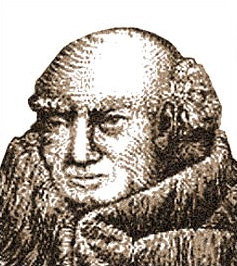In the 1800s
In the 1820s to 1830s, pandeism received some mention in Italy. In 1832 and 1834, publishers Angelo Ajani and Giovanni Silvestri, respectively, each posthumously published volumes of sermons of Italian Padre Filippo Nannetti di Bibulano (aka il Filippo Nani, Padre da Lojano; 1759–1829), who named pandeism as being among beliefs he condemned, railing against "Jews, Muslims, Gentiles, Schismatics, Heretics, Pandeists, Deists, and troubled, restless spirits." [20] Nannetti further specifically criticized pandeism, declaring, "To you, fatal Pandeist! the laws that create nature are contingent and mutable, not another being in substance with forces driven by motions and developments." [21] In 1838, another Catholic Italian, phrenologist Luigi Ferrarese in Memorie Riguardanti la Dottrina Frenologica ("Thoughts Regarding the Doctrine of Phrenology") critically described Victor Cousin's philosophy as a doctrine which "locates reason outside the human person, declaring man a fragment of God, introducing a sort of spiritual pandeism, absurd for us, and injurious to the Supreme Being." [22]
Towards the end of the century, in 1897, Reverend Henry Grattan Guinness wrote critically that in India, "God is everything, and everything is God, and, therefore, everything may be adored. ... Her pan-deism is a pandemonium." [23]
Twentieth century on
A 1906 editorial by a Unitarian minister in the Chattanooga Daily Times stated that Jesus, "who in exultant faith said 'I and the Father are one,' was a Pandeist, a believer in the identification of the universe and all things contained therein with Deity." [24]
Christian reconstructionist Rousas John Rushdoony sharply criticized the Catholic Church in his 1971 The One and the Many: Studies in the Philosophy of Order and Ultimacy, asserting, “The position of Pope Paul came close to being a pan-Deism, and pan-Deism is the logical development of the virus of Hellenic thought." [25] Adventist theologian Bert B. Beach wrote in 1974 that "during the Vatican Council there was criticism from WCC Circles" to the effect that "ecumenism was being contaminated by “pan-Deist” and syncretistic tendencies." [26]
In 1996, Pastor Bob Burridge of the Genevan Institute for Reformed Studies wrote in his Survey Studies in Reformed Theology an essay on "The Decrees of God," [27] also identifying the notion of God becoming the universe as incompatible with Christianity, writing, "All the actions of created intelligences are not merely the actions of God. He has created a universe of beings which are said to act freely and responsibly as the proximate causes of their own moral actions. When individuals do evil things it is not God the Creator and Preserver acting. If God was the proximate cause of every act it would make all events to be "God in motion". That is nothing less than pantheism, or more exactly, pandeism."
Burridge disagreed that such is the case, decrying that "The Creator is distinct from his creation. The reality of secondary causes is what separates Christian theism from pandeism." [27] Burridge concludes by challenging his reader to determine why "calling God the author of sin demand[s] a pandeistic understanding of the universe effectively removing the reality of sin and moral law." [27]
Ronny Miron, writing of Alan M. Olson's explanation of the views of Karl Jaspers, noted his opinion that "the fear that pandeism or the tendency to reduce faith into the external means by which it is obtained would eventually lead to the viewing of these means as having purely subjective, and also mutable, validity, was behind the Catholic church's emphasis on the objective truth of the symbols themselves in relation to the individual religious experience". [28]
Christian apologist John Oakes has described pandeism as an "ad hoc and a weak marriage" of pantheism and deism. [29] English theologian and Anglican priest, Graham Ward, insists that "Attention to Christ and the Spirit delivers us from pantheism, pandeism, and process theology," [30] Consistent with a broader Catholic rejection of the New Age movement, in 2013, Catholic author Al Kresta observes that: "New Age" cosmologies reject materialism, naturalism and physicalism. They are commonly pantheistic or pandeistic. They frequently try to commandeer quantum physics and consciousness studies to illustrate their conception of the cosmos." [31] In 2022 minister Brent Price described pandeism as "a very contemporary deceptive religious concept that targets uninformed and unsaved people," explaining his view that "this false religious view is why many have come to believe that God, the Creator of the universe, no longer exists, because He became the universe and is now the universe." [32]

